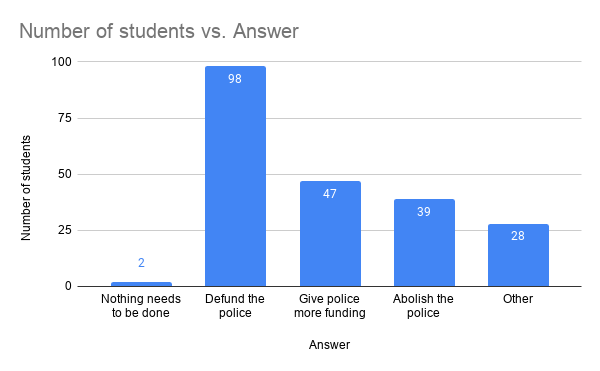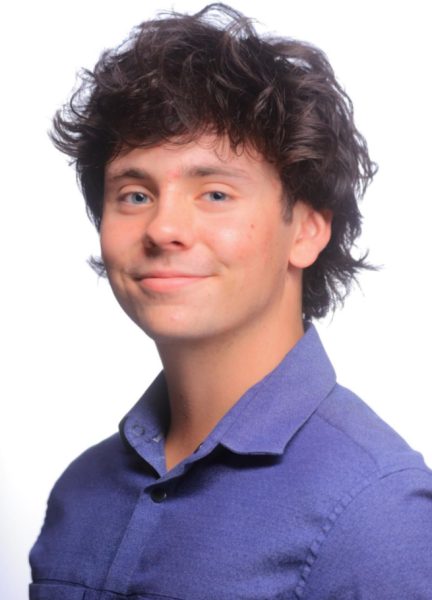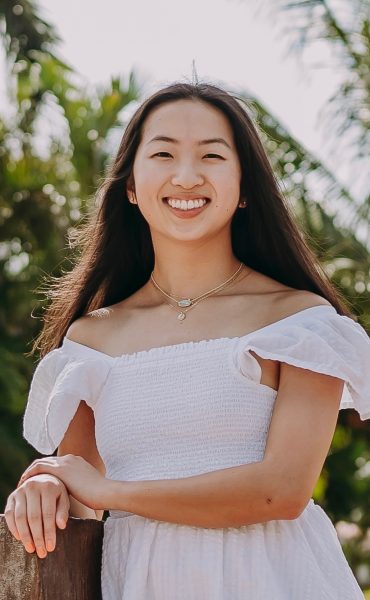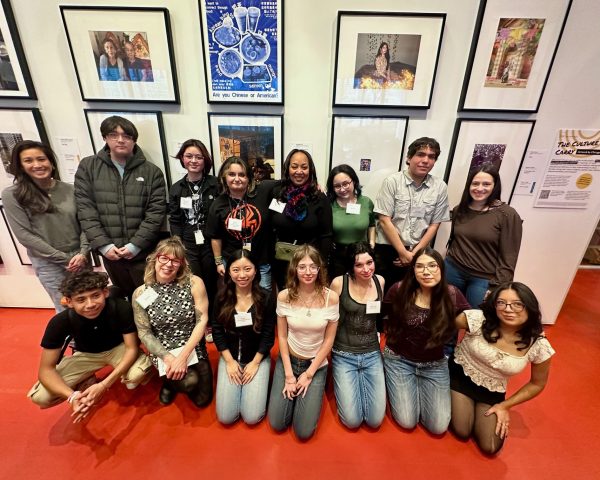Lane students believe police reform is needed, Warrior survey shows

Students who filled out the Warrior’s survey were asked what they though needed to be done to combat police brutality and could check multiple answers. The majority of students (98) believed that the police should be defunded.
The country has faced nationwide Black Lives Matter protests after the police killings of George Floyd and Breonna Taylor. Over the last couple of months, racism has been an increasingly prevalent issue in the Lane community after the grand jury decision of the Breonna Taylor case and an advisory lesson created by the Lane administration. Many Lane students have been very vocal about this issue: posting on social media, emailing the Lane Tech administration and holding student-led protests on campus, among other things.
A survey, created by The Warrior, was released in the Lane student newsletter and aimed to discover what Lane students thought about issues regarding police brutality and systemic racism.
Of the 143 students across all grade levels who filled out that survey, 96% agreed that racism was a major issue in America, and 92% agreed that systemic racism and police brutality are major issues that need solving. The survey also asked students what they believe should be done to combat the issue of police brutality, with the option to choose multiple answers.
The majority of students in the survey (68.5%) supported the idea of defunding the police and reallocating the funds to other resources like mental health services. According to a Gallup poll, 47% of all Americans support defunding the police. Of the youngest group surveyed, ages 18-34, 81% supported defunding the police. Supporters of this proposal believe that by funding mental health programs and education, there will be less crime and therefore less of a need for police.
Daniel Velazquez, Div. 161, said that the current police force is rooted in deeply racist conditions and that the current policing system needs to be abolished and replaced with one that treats all Americans fairly; 27% of the students who filled out the survey agreed with him. Velazquez said he attended multiple protests after the killing of George Floyd and was disappointed to see the protests being misrepresented on the local news.
“The media highlighted the actions of a small minority, and mischaracterized justified anger as a desire to loot and destroy the city and for no good reason,” Velazquez said.
Alex Baldauf, Div. 478, said he believes that the police should be given more funding in order to give more training.
“I would add more money, more funding to the system for things like mental health services and training police better for certain situations more,” Baldauf said.
Of students who filled out the survey, 33% also supported giving the police more money. According to NPR, many police departments already have implicit bias training for their officers, which aims to reduce racial bias in officers; but a study on the NYPD, conducted by John Finn Institute forPublic Safety and the IACP/UC Center for Police Research and Policy, found that even after the implicit bias training, racial disparities did not change and in some cases even increased. Baldauf said he hopes that by giving the police more funding, they can create better training programs that will actually reduce racial disparities in the police force.
AP Government teacher Ms. Smith is extremely impressed with the volume of Lane students voicing their opinion, not only in her class but in the Lane community.
Smith said she values student voices and the discussions that are held in class on current events.
“[My job is] just making sure that they’re knowledgeable about the situation and then giving them the opportunity just to voice their opinions,” Smith said.
Last month, a grand jury decided to close Breonna Taylor’s case and charge just one officer, Brett Hankinson, with wanton endangerment. This caused another nationwide outcry. Some classes at Lane held discussions about the grand jury’s decision and what it meant for the Breonna Taylor case.
Smith said she felt it was important to make sure that her students knew what had happened in this grand jury decision and its implications.
“Just to clear up any misunderstandings and also to provide them with a forum to be able to get whatever it is off their chest, is kind of my purpose,” Smith said.
A couple weeks after these discussions, advisory classrooms were given a presentation on Black Lives Matter and racism that was met with heavy criticism.
Both Velazquez and Baldauf said that despite being heavily criticized, the presentation was a step in the right direction.
“It was just not enough,” Velazquez said.
He said he understands that it is hard for some teachers to have these conversations, but is concerned about the lack of preparation he thinks went into the meeting.
The majority of Lane students agree that systemic racism and police brutality are major issues, but disagree on what to do about it, much like the rest of the country.
Despite these disagreements on the solutions, students can come together, (and already have), to protest the problem.
There is hope that this generation of young people can make a difference and let people know that the current climate is not acceptable, Smith said.
Your donations directly fund the Lane Tech student journalism program—covering essential costs like website hosting and technology not supported by our school or district. Your generosity empowers our student reporters to investigate, write, and publish impactful stories that matter to our school community.
This website is more than a publishing platform—it's an archive, a research tool, and a source of truth. Every dollar helps us preserve and grow this resource so future students can learn from and build on the work being done today.
Thank you for supporting the next generation of journalists at Lane Tech College Prep!



